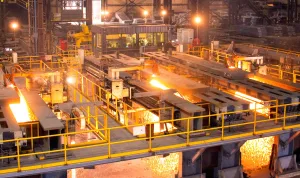How the Global Steel Market Impacts Nucor Corporation: A Comprehensive Analysis

As a leading steel producer, Nucor Corporation operates within a complex and dynamic global steel market. Understanding how global market trends affect Nucor provides valuable insights into the company’s strategies and performance. This article explores the various ways the global steel market impacts Nucor, from pricing and supply chain challenges to competitive pressures and strategic responses.
Global Steel Market Overview
The global steel market is characterized by fluctuations in supply and demand, geopolitical factors, trade policies, and economic conditions. Key trends include:
- Price Volatility: Steel prices are influenced by global supply and demand, raw material costs, and trade policies. Prices can fluctuate significantly, affecting profit margins for steel producers.
- Supply Chain Dynamics: The global steel supply chain involves raw material sourcing, production, and distribution. Disruptions or changes in any part of the supply chain can impact steel producers.
- Trade Policies and Tariffs: International trade policies and tariffs play a crucial role in shaping the global steel market. Policies such as import duties and export restrictions can affect market access and competition.
Impact on Nucor Corporation
- Pricing and Profit Margins
Global steel market fluctuations directly influence Nucor’s pricing strategies and profit margins. When global steel prices rise, Nucor may benefit from higher selling prices for its products. Conversely, during periods of price decline, the company faces pressure to maintain competitive pricing while managing its cost structure. Nucor’s use of electric arc furnaces, which rely on recycled scrap metal, provides some insulation against raw material price volatility, but the overall market conditions still impact profitability. - Supply Chain Challenges
The global steel market affects Nucor’s supply chain in several ways. Variations in the availability and cost of raw materials, such as scrap metal and alloys, influence production costs and operational efficiency. Additionally, disruptions in global supply chains, such as shipping delays or logistical issues, can impact the timely delivery of materials to Nucor’s facilities. The company’s strategic focus on regional sourcing and robust supplier relationships helps mitigate some of these challenges. - Competitive Pressures
Nucor operates in a competitive global steel market where both domestic and international players vie for market share. Global competitors’ pricing strategies, technological advancements, and production capacities impact Nucor’s market position. To maintain its competitive edge, Nucor invests in technology, innovation, and efficiency improvements. Understanding global market trends enables Nucor to adapt its strategies and stay ahead of competitors. - Strategic Responses
Nucor’s response to global steel market dynamics includes several strategic initiatives:- Diversification: Nucor diversifies its product portfolio to address varying market demands and reduce reliance on any single market segment.
- Innovation: The company invests in research and development to enhance its steel products and production processes, aiming to meet evolving market needs and maintain a technological edge.
- Cost Management: Nucor focuses on cost management and operational efficiency to navigate price fluctuations and maintain profitability. This includes optimizing production processes and implementing cost-saving measures.
- Economic and Geopolitical Factors
Economic conditions and geopolitical events, such as trade wars or economic sanctions, influence the global steel market and, consequently, Nucor’s operations. The company monitors global economic indicators and geopolitical developments to anticipate potential impacts on its business and adjust its strategies accordingly.
Future Outlook
As the global steel market continues to evolve, Nucor will likely face ongoing challenges and opportunities. The company’s ability to adapt to market changes, invest in innovation, and manage its supply chain effectively will play a crucial role in its future success. Monitoring global market trends and implementing strategic responses will be key to maintaining Nucor’s competitive position and achieving long-term growth.
Conclusion
The global steel market has a profound impact on Nucor Corporation, influencing pricing, supply chain dynamics, competition, and strategic decisions. By understanding these impacts and implementing effective strategies, Nucor navigates the complexities of the global market and positions itself for continued success. As the market evolves, Nucor’s proactive approach and adaptability will be essential in maintaining its leadership in the steel industry.



